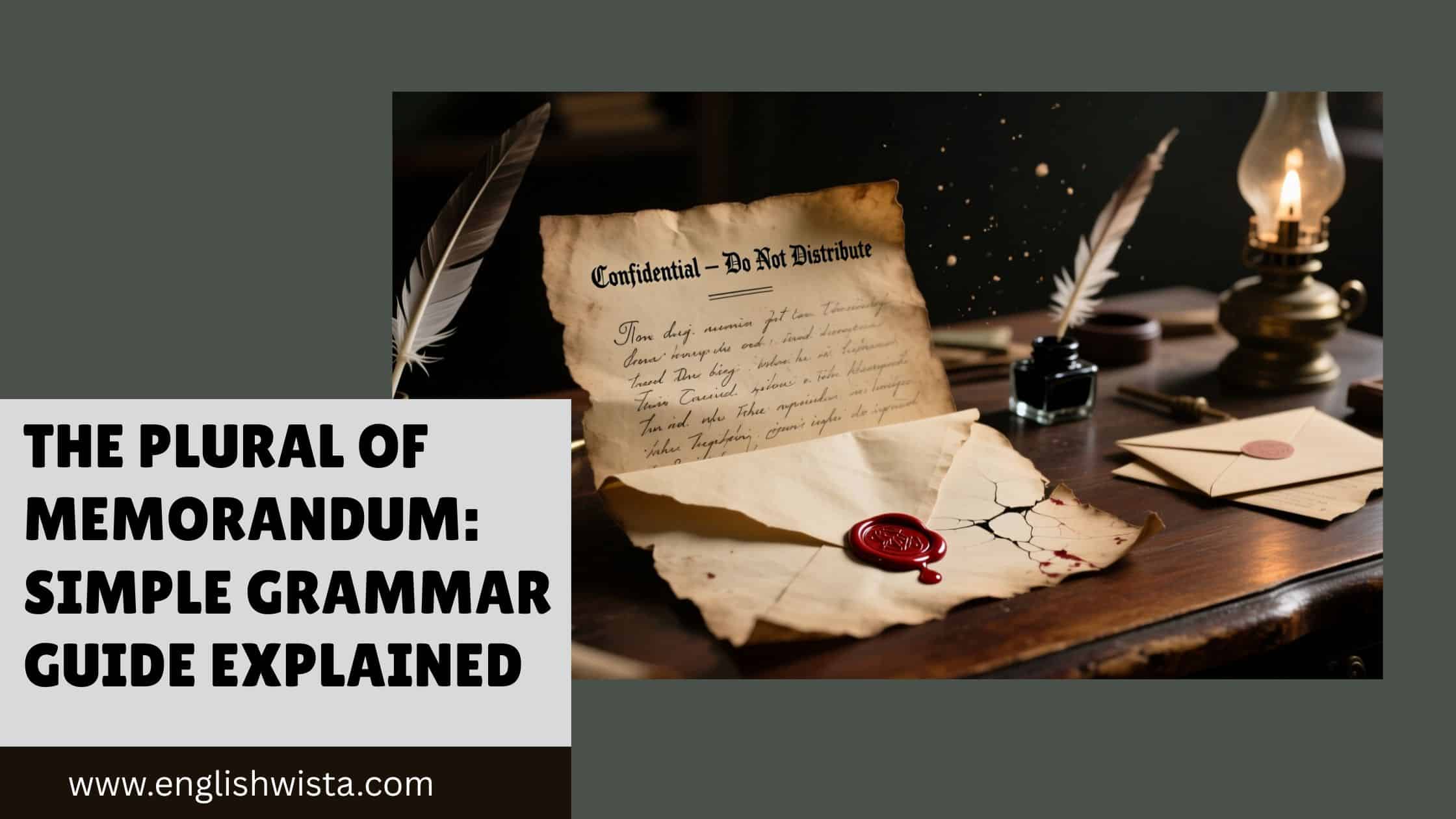Have you ever stumbled on a word that makes you pause and wonder, “Wait… how do I make this plural?” If you’ve found yourself scratching your head over the word memorandum, you’re not alone. It looks fancy, it feels official, and it carries that Latin vibe that can sometimes confuse us when it comes to plurals. Is it memorandums? Memoranda? Or something else entirely?
Don’t worry. In this article, we’ll explore everything you need to know about the plural of memorandum. We’ll keep it light, friendly, and fun like a chat with a friend who loves words but doesn’t want to drown you in grammar rules. By the end, you’ll feel confident using the word in any situation, whether you’re writing a school essay, a business email, or just showing off your trivia knowledge.
So grab your mental notebook, and let’s dive in!
What Does Memorandum Mean?
Before we talk about plurals, let’s start with the singular form: memorandum.
A memorandum (often shortened to “memo”) is a short written message or record. It’s usually used in offices, schools, or organizations to remind people of something, record decisions, or communicate official information. Think of it as a note that says, “Here’s something important you should remember.”
Simple definition:
- Memorandum = a written note or message, usually for official or business use.
Example sentences:
- “The manager sent a memorandum about the new safety rules.”
- “I wrote a memorandum to remind myself of the meeting schedule.”
So far, so good. Now, let’s move to the fun part the plural!
What Is the Plural of Memorandum?
Here’s the big reveal: the plural of memorandum can be either memoranda or memorandums. Yes, both are correct!
That’s where the confusion comes in. Some words in English, especially those borrowed from Latin, can keep their original Latin plural forms. That’s why memorandum can turn into memoranda. But at the same time, English also allows the more regular plural ending, giving us memorandums.
So, you actually have two options. Let’s explore them:
- Memoranda = the Latin-style plural, often used in formal writing.
- Memorandums = the English-style plural, more common in everyday speech and writing.
Which One Should You Use?
The answer depends on your audience and situation.
- In formal or academic writing: Memoranda often looks more polished and traditional. For example, in law, government, or academic papers, you might see “memoranda” more often.
- In casual or business settings: Memorandums feels natural and straightforward. Many companies use “memorandums” in their documents.
Think of it like wearing clothes: both “memoranda” and “memorandums” are correct outfits, but one feels a bit more formal than the other.
Quick Comparison Examples
Here are some simple examples to show the difference in use:
With Memoranda:
- “The lawyer reviewed the memoranda submitted to the court.”
- “Several memoranda outlined the company’s policies.”
With Memorandums:
- “Three memorandums were pinned to the office bulletin board.”
- “He sent out memorandums to all staff members.”
See? Both sound fine, and both are correct. It’s just a matter of style and preference.
Is Memorandum Singular or Plural?
This is a common question. The word memorandum is singular. That means it refers to just one document or message. If you want to talk about more than one, you’ll need either memoranda or memorandums.
Example:
- Singular: “The teacher wrote a memorandum.”
- Plural: “The teachers shared their memoranda.”
So remember: memorandum = one, memoranda/memorandums = more than one.
Where Did the Word Come From?
Now for a little history! Words often make more sense when we understand their origins.
The word memorandum comes from Latin. In Latin, “memorandum” literally means “something that must be remembered.” How perfect is that? A memo is exactly that a note you write down so you don’t forget!
In Latin, the plural form was memoranda, which is why we still see it used today. But as the word entered English, people also started using the more regular “-s” plural form, memorandums.
So both options exist because English loves flexibility it borrows words from other languages but also adapts them to its own rules.
Other Words Like Memorandum
Memorandum isn’t alone in this “two plural forms” situation. There are other Latin-based words in English that follow the same pattern.
Examples:
- Datum → Data (or Datums, in some cases)
- Medium → Media (or Mediums, depending on meaning)
- Curriculum → Curricula (or Curriculums)
Just like memorandum, these words can have either a Latin-style plural or an English-style plural.
Example sentences:
- “This curriculum includes five different courses.”
- “The university offers new curricula for its science programs.”
See how it works? Memorandum fits right in with this group of flexible words.
Practical Usage Tips
Here are some easy tips to help you decide when to use memoranda vs. memorandums:
- Check your audience.
- Writing for a professor, a lawyer, or a government office? Use memoranda.
- Writing an office email or a casual report? Use memorandums.
- Follow consistency.
- Pick one form and stick with it throughout your writing. Switching back and forth can look messy.
- When in doubt, go with memorandums.
- Most modern English speakers will understand and accept it easily.
Fun Fact: Shortened Form “Memo”
Here’s a little bonus: instead of saying memorandum or worrying about the plural, many people just use memo. It’s shorter, easier, and very common in workplaces.
Example sentences:
- Singular: “Please read the memo on your desk.”
- Plural: “Several memos were distributed yesterday.”
Using “memo” sidesteps the whole memoranda/memorandums debate!
Real-Life Example Scenarios
Let’s put this into practice with everyday situations.
At Work:
- “The HR department issued three memoranda about the dress code.”
- Or: “The HR department issued three memorandums about the dress code.”
Both correct, your choice!
In School:
- “The principal wrote a memorandum about the holiday schedule.”
- “Teachers received memoranda reminding them of staff meetings.”
In Law:
- “The judge reviewed memoranda from both attorneys.”
Notice how the word feels slightly more serious in legal or academic settings.
Common Mistakes to Avoid
Because the word looks unusual, people sometimes make mistakes. Let’s clear those up:
- ❌ Saying “memorandum’s” when you mean plural. (“Memorandum’s” means possession, not plural.)
- ❌ Mixing memoranda and memorandums in the same piece of writing.
- ❌ Thinking “memorandum” itself is plural it’s not!
Why English Allows Both Forms
English is known as a “borrowing” language. It has taken words from Latin, Greek, French, German, and many other languages. Sometimes English keeps the original grammar rules, and sometimes it bends them to fit its own system. That’s why we end up with words like memorandum that allow both the Latin and English styles.
This flexibility might seem confusing, but it’s actually one of the strengths of English it gives us choices!
Quick Recap
Let’s summarize what we’ve learned so far:
- Memorandum is singular.
- The plural can be memoranda (Latin style) or memorandums (English style).
- Both are correct your choice depends on formality and audience.
- “Memo” is a simple, common alternative.
- The word comes from Latin, meaning “something to be remembered.”
Conclusion
So, what’s the plural of memorandum? Easy answer: it can be memoranda or memorandums. Both are correct, both are useful, and neither is wrong. The trick is knowing when to use which one.
If you’re writing something formal, go with memoranda. If you’re keeping it casual or practical, memorandums is perfectly fine. And if you don’t want to worry about it at all, just use memos and call it a day!
At the end of the day, words are tools. They help us communicate and share ideas. Whether you say memoranda, memorandums, or memos, the important thing is that your reader understands you.
And now, the next time someone asks, “What’s the plural of memorandum?” you’ll have the answer ready maybe even with a fun fact or two to share.



